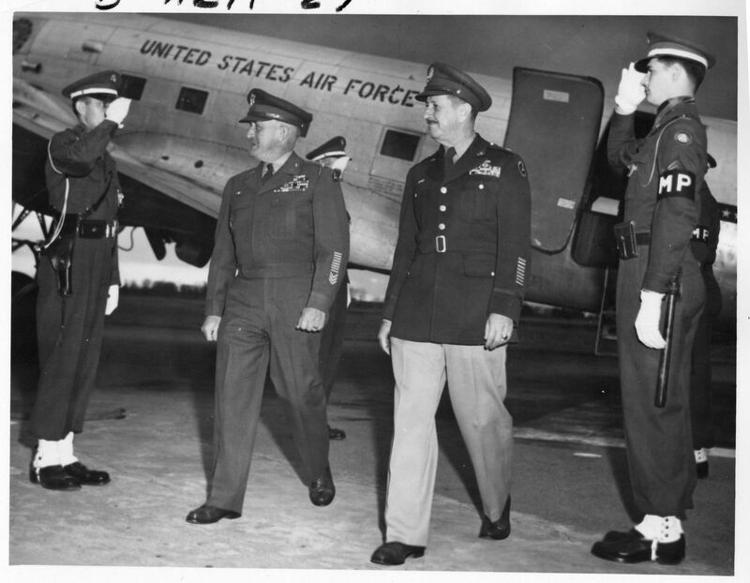
Crump Garvin (second from right) arrives at the Dothan, Alabama, Municipal Airport to take command of Camp Rucker. Garvin, a native of Harrison, was in charge of supplies during the Korean War.
Written by David Holsted, published in the Harrison Daily Times on July 16, 2020
In the spring of 1951, Communist forces in North Korea began their spring offensive. U.S. Army Major General Crump Garvin, for one, was glad to see it.
“It will get them out in the open,” Garvin said. “You can kill a lot more of them that way.”
The outspoken general from Harrison, Arkansas, was on a roll.
“It would appear to me,” he said, “that they need one more good whipping before they’re ready to do any talking. Of course, China has a puppet government. The Politburo and Uncle Joe Stalin have to decide when the talking will begin.”
Garvin uttered this pronouncement in April, 1951, in Little Rock, where he was visiting his brother, O. W. “Pete” Garvin. Since July 4, 1950, Garvin had been in charge of supply at the South Korean seaport of Pusan.
The difficulty of Garvin’s task as supply officer was immense.
“But the GI Joes of the United Nations forces had to be served, even though the supply lines from Pusan into the interior ran over perilous mountains and rain soaked terrain during the summer months and almost impassable trails and snow and sleet-swept valleys in winter, with mercury almost frozen in thermometers.”
Garvin was born in 1898 in Harrison. His parents were Ford M. and Mintie Crump Garvin. His grandfather was George J. Crump, one of Arkansas’ earliest lawyers.
Garvin attended Hendrix College before entering the U. S. Military Academy at West Point. When he graduated in 1920, the commandant at West Point was Gen. Douglas MacArthur. Garvin later served his first overseas assignment under MacArthur in the Philippines in 1924-26. He also served under MacArthur in World War II and the Korean War.
During his time in the Army, Garvin was stationed at Fort Benning, Georgia; Jefferson Barracks, Missouri; Fort Sill, Oklahoma; Atlanta; Hawaii; and Yokohama, Japan. He spent 45 months overseas during World War II.
In 1922, Garvin married Ollie Tully of Eufala, Alabama.
While in command at Pusan, Garvin took particular interest in the 936th and 937th Field Artillery groups. The men were from Arkansas, and Garvin watched them as they prepared for battle.
“They are both fine outfits,” Garvin said. “The spirit was high and they wanted to get right into it. They were two of the best outfits I saw, and I saw all of the men going into Korea.”
Commenting on the war effort in Korea, Garvin said the morale of American troops was improving. Supplies were coming through better, and morale was boosted by advances made against the enemy.
“We still think we can give them (the Reds) a good licking,” Garvin said emphatically.
While in Little Rock, the general and his wife saw for the first time their grandson, George Handley III, who was born at Adams Field. The boy’s mother was Kakii Garvin Handley, who was the Cotton Bowl queen in 1947. George Handley Jr. was a captain, stationed at Fort Sill.
The Garvins’ other children were First Lt. Ford Garvin and First Lt. Daniel Garvin, both stationed in the Far East with the Air Force.
After visiting friends and relatives in Arkansas, Garvin went to Camp Rucker in Alabama, where he took over as commanding officer.
On May 4, 1951, the Enterprise (Ala.) Ledger did a feature on the new commanding officer of Camp Rucker.
“Out in Boone County, Arkansas, they’re ‘powerful proud’ of Crump Garvin.
“And in the shade trees that stand like silent sentinels keeping their vigil over a passing world, old timers still watch the sun go ’round the cannon in the square in front of the courthouse and talk about the yesteryears when Crump Garvin’s folks were perusing the local public prints for news of the Spanish-American War.
“The man of whom this quiet Arkansas county seat of more than five thousand friendly folks are proud is none other than Major General Crump Garvin, proud possessor of the Distinguished Service Medal, the Legion of Merit, the Bronze Star and the Commendation Ribbon.”
Garvin died on September 10, 1990, in Atlanta. He was buried in Marietta (Georgia) National Cemetery.
